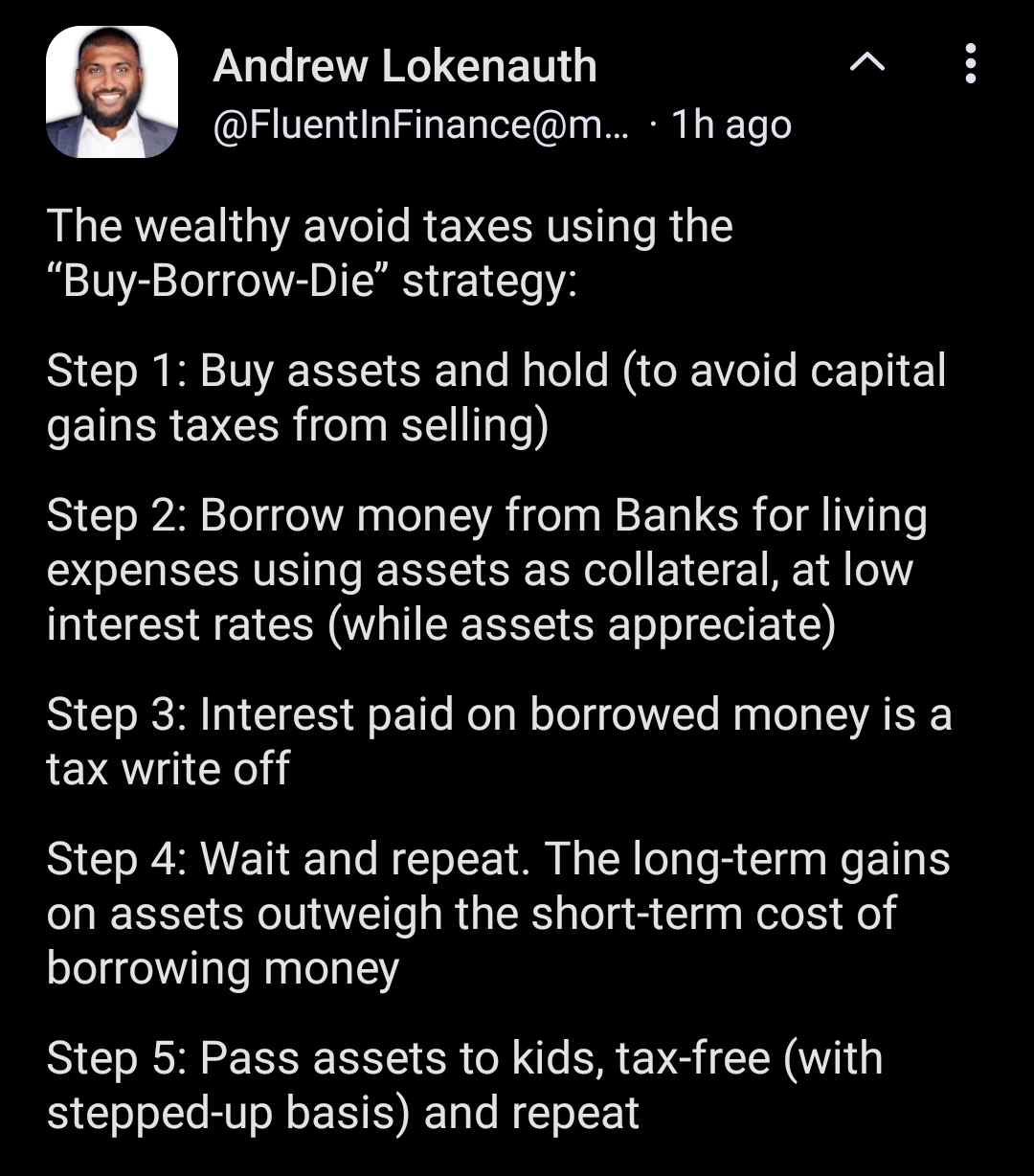this post was submitted on 14 Jan 2024
664 points (98.3% liked)
People Twitter
8055 readers
515 users here now
People tweeting stuff. We allow tweets from anyone.
RULES:
- Mark NSFW content.
- No doxxing people.
- Must be a pic of the tweet or similar. No direct links to the tweet.
- No bullying or international politcs
- Be excellent to each other.
- Provide an archived link to the tweet (or similar) being shown if it's a major figure or a politician.
founded 2 years ago
MODERATORS
you are viewing a single comment's thread
view the rest of the comments
view the rest of the comments

I feel like I'm too poor to understand what happens between steps 2 & 3 without having a job. How are they paying the loans off? Where does that money come from? And if they have an income in order to pay the loan, why get the loan to begin with?
The investment assets can be assumed to appreciate at, say, 7% (reasonably accurate historical US stock market performance). The loan is at a lower interest rate (let's say 3%, which is a number I just pulled out of my ass).
So what they do is take out a loan secured against their investments (which is why it doesn't require having an income to get approved), get a huge lump sum of cash and put that in their bank account. They make payments on the loan by drawing down that lump sum (along with their living expenses or whatever else they want to use the money for). Since the interest rate is >0%, obviously they would run out of money before paying the loan back, right? Well, that's the trick: by the time that happens, their assets have appreciated enough to have enough collateral to get another loan, so they rinse and repeat.
Note that the last line ("assets have appreciated enough to have enough collateral to get another loan") implies that these loans are relatively small compared to the assets backing them. I'm not going to bother doing any actual math, but basically this strategy only works if the expenses you want to cover are some single-digit percentage of your asset value. In other words, if you wanted to borrow $50k/year, you would need more than $1M in assets.
You do this loan thing instead of just living off the dividends because withdrawing the dividends from your investment account incurs capital gains taxes, while getting a loan doesn't.
Where are you getting a loan for 3% while the stock market is performing at 7%? I always see these arguments, but borrowed interest is almost never lower than gains. That's why step 2 of any worthwhile financial plan is always "pay off your credit cards and high interest loans", right after "save enough for an emergency fund". "Invest your money" doesn't come until a few steps later.
Banks will happily take 3% risk free from someone sufficiently wealthy given the associated relationship benefits: a multi-millionaire or billionaire is probably going to hire that bank for wealth management and pay fees, etc, etc.
I'll have to take your word for it, I guess. It'll be a long time before I have a million dollars cash.
That's true for most folks, and is why it's so hard for people who aren't ultra wealthy to understand just how different the world is when you have that kind of wealth; a world where the law and the financial system and the basic experience of the economy is completely and utterly different due to the power and influence that wealth brings.
Heck, most people can't even truly grok the scale of the difference between an average person and a multi-millionaire or billionaire. The human brain just doesn't process large numbers like that well.
I'm far from rich, but I do have a paid off house in a low CoL area, and a have decent chunk of retirement savings put away, and even then I get different treatment: better credit cards, better loan products, etc. The industry calls it "qualifying" but what it really is is monetary gatekeeping.
It's particularly weird having grown up relatively poor because I've lived the shift and can see how expensive it was to be poor, and how relatively easy it is for the rich to get richer.